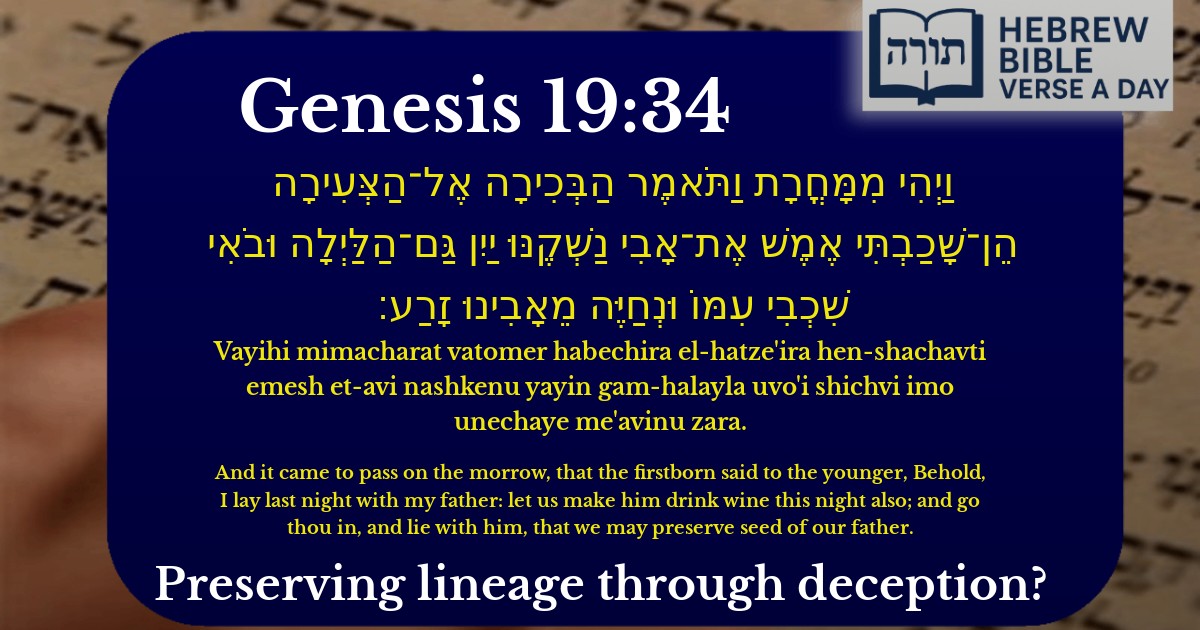Join Our Newsletter To Be Informed When New Videos Are Posted
Join the thousands of fellow Studends who rely on our videos to learn how to read the bible in Hebrew for free!
Hebrew Text
וַיְהִי מִמָּחֳרָת וַתֹּאמֶר הַבְּכִירָה אֶל־הַצְּעִירָה הֵן־שָׁכַבְתִּי אֶמֶשׁ אֶת־אָבִי נַשְׁקֶנּוּ יַיִן גַּם־הַלַּיְלָה וּבֹאִי שִׁכְבִי עִמּוֹ וּנְחַיֶּה מֵאָבִינוּ זָרַע׃
English Translation
And it came to pass on the morrow, that the firstborn said to the younger, Behold, I lay last night with my father: let us make him drink wine this night also; and go thou in, and lie with him, that we may preserve seed of our father.
Transliteration
Vayihi mimacharat vatomer habechira el-hatze'ira hen-shachavti emesh et-avi nashkenu yayin gam-halayla uvo'i shichvi imo unechaye me'avinu zara.
Hebrew Leining Text
וַֽיְהִי֙ מִֽמׇּחֳרָ֔ת וַתֹּ֤אמֶר הַבְּכִירָה֙ אֶל־הַצְּעִירָ֔ה הֵן־שָׁכַ֥בְתִּי אֶ֖מֶשׁ אֶת־אָבִ֑י נַשְׁקֶ֨נּוּ יַ֜יִן גַּם־הַלַּ֗יְלָה וּבֹ֙אִי֙ שִׁכְבִ֣י עִמּ֔וֹ וּנְחַיֶּ֥ה מֵאָבִ֖ינוּ זָֽרַע׃
וַֽיְהִי֙ מִֽמׇּחֳרָ֔ת וַתֹּ֤אמֶר הַבְּכִירָה֙ אֶל־הַצְּעִירָ֔ה הֵן־שָׁכַ֥בְתִּי אֶ֖מֶשׁ אֶת־אָבִ֑י נַשְׁקֶ֨נּוּ יַ֜יִן גַּם־הַלַּ֗יְלָה וּבֹ֙אִי֙ שִׁכְבִ֣י עִמּ֔וֹ וּנְחַיֶּ֥ה מֵאָבִ֖ינוּ זָֽרַע׃
🎵 Listen to leining
Parasha Commentary
📚 Talmud Citations
This verse is not quoted in the Talmud.


Context of the Verse
This verse (Genesis 19:34) describes the actions of Lot's daughters after the destruction of Sodom and Gomorrah. Believing they were the only survivors, they sought to perpetuate their father's lineage through unconventional means. The verse raises moral and theological questions, which are addressed by traditional Jewish commentators.
Rashi's Commentary
Rashi explains that Lot's daughters mistakenly believed the entire world had been destroyed, similar to the generation of the Flood. They reasoned that their actions were necessary to preserve humanity. Rashi notes that their intentions were לשם שמים (for the sake of Heaven), though their method was improper.
Rambam's Perspective
In Mishneh Torah (Hilchot Yesodei HaTorah 5:6), Rambam discusses how even well-intentioned actions must align with halachah. While Lot's daughters may have acted out of perceived necessity, their approach violated Torah principles. This serves as a lesson in proper decision-making even under extreme circumstances.
Midrashic Interpretation
The Midrash (Genesis Rabbah 51:8) states that the wine mentioned in the verse was actually from the grapes of Sodom, which were exceptionally intoxicating. This explains how Lot, who was previously righteous, could have been unaware of their actions.
Moral Lessons
Nachmanides' Insight
Nachmanides (Ramban) notes that while the Torah records these events factually, it does not endorse the actions. The resulting nations of Moab and Ammon (descendants of this union) later caused difficulties for Israel, demonstrating that improper means cannot lead to truly positive ends.